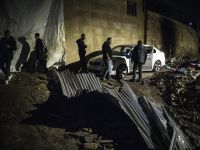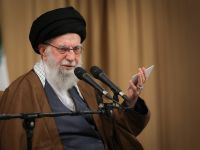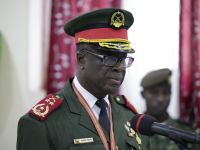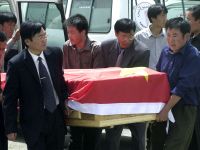In a long, stern letter to the United Nations, Iraq's foreign minister complained that the new Security Council resolution on weapons inspections provides a pretext for the United States to wage war against his country.
"There is premeditation to target Iraq, whatever the pretext," Foreign Minister Naji Sabri wrote to U.N. Secretary-General Kofi Annan in a letter released Sunday.
In his letter, Sabri said any "inaccurate statement (among) thousands of pages" would be turned into a pretext for the United States to wage war against his country.
The first working group of 18 inspectors arrives Monday on a flight from a U.N. rear base in Cyprus, and their first inspection is expected early Wednesday. According to AP, the working group joins almost 40 support staff who have come to Baghdad in the past week to re-establish U.N. monitoring after a four-year absence. The number of inspectors in Iraq at any one time is due to rise to 80 to 100 by year-end.
On Sunday, U.N. computer, telephone and other technicians were laying the groundwork for what is expected to be months of field missions.
"We are still testing our communications equipment to make sure we have secure lines," said Hiro Ueki, spokesman for the U.N. Monitoring, Verification and Inspection Commission, UNMOVIC.
A "hot line" link was planned between the center and an Iraqi government liaison agency. The special link is designed "to make our communications smooth," said Ueki. "In case something happens" — that is, trouble during an inspection mission — "we can communicate with each other."
Rumsfeld
Washington has indicated if weapons inspectors can verify Iraq has disarmed, America will not insist on Saddam Hussein leaving office.
Speaking to CNN, U.S. Defense Secretary Donald Rumsfeld noted that Iraq's verifiable disarmament without Saddam Hussein leaving office could represent a solution to the current standoff.
"The reason the president decided to go into the United Nations and accept the reality that inspections might not work, was that he concluded that war is the last choice, not the first choice," Rumsfeld said. "Any time the use of force is a possibility, people have to recognize that it is your last choice, not your first - that any time people's lives are going to be put at risk, you have to have a darn good reason," Rumsfeld conveyed.
He added the Iraqi president might see the seriousness of the UN Security Council Resolution 1441 requiring Baghdad to account for its weapons of mass destruction as a sign that the game was up and it was time for him to leave the country and go into exile with his family and friends.
"It might be that he would change his mind and open his country up and say, 'Well, I'd rather stay in power; then I'm willing to give up my weapons of mass destruction'," Rumsfeld aired.
Rumsfeld said he believed the inspectors' success would largely depend on Baghdad's willingness to cooperate with them. "I do think that any inspector would have a very difficult time being successful if the nation and the government, the regime was determined to frustrate their efforts," he said. (Albawaba.com)
© 2002 Al Bawaba (www.albawaba.com)







